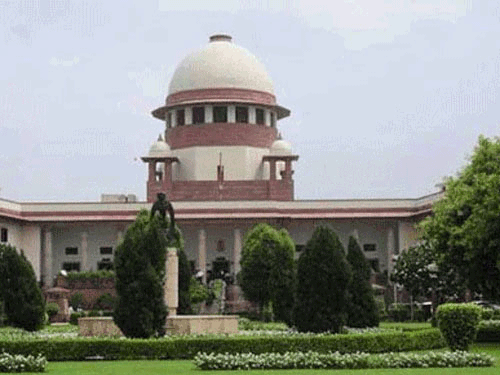
The judiciary faced several challenges in 2014, but people also derived a lot of hope from the Supreme Court, which delivered several landmark verdicts on issues ranging from electoral reforms to corruption and probity in public offices.
The Supreme Court, though kept busy almost throughout the year with the spot-fixing and betting case in Indian Premier League (IPL) 2013 and the Sahara-Sebi case, was seen taking a tough stance in both.
The year also saw two new chief justices of India take charge of the judiciary and leave their mark s on it through their style, conduct of court proceedings and administrative decisions.
Two new law ministers also assumed office this year, besides a team of law officers following the change of government at the Centre.
Delivering a tough message, the Supreme Court sent Sahara top boss Subrata Roy to jail for failure to pay back over Rs 20,000 crore to market regulator Sebi.
The Board of Control for Cricket in India was left red-faced by the searching questions the court posed over the conflict of interest between cricket administration and IPL ownership.
The Supreme Court,, which dealt with an iron hand in removing Ranjit Sinha from the post of Central Bureau of Investigation director for “hobnobbing with the accused” in the 2G scam case, was left to defend itself when the government chose senior advocate Gopal Subramanium for elevation as apex court judge.
So piqued was the senior advocate by the judiciary's failure to put its foot down that he vowed not to appear before the Supreme Court, till retirement of then chief justice of India R M Lodha.
The cancellation of coal block allocation, giving transgenders entitlement as the third gender, ordering for conclusion of trials against MPs and MLAs within one year of framing charges, giving the Election Commission power to disqualify candidates for filing false affidavits and providing a fresh lease of life for condemned prisoners due to inordinate delay in execution were some of the highs for the apex court.
Among other remarkable verdicts, the Supreme Court struck down a special provision in law warranting prior approval from the Central government for probing officers of the joint secretary level or above. It also quashed the Karnataka government decision to impose the mother tongue as medium of instruction for schoolchildren.
This year, the government passed a National Judicial Appointment Commission bill replacing the collegium system of appointment of judges in the Supreme Court and high courts , taking away the power hitherto enjoyed by judges to select their colleagues.
Though the Supreme Court, has declined to entertain a public interest litigation argued by eminent jurist Fali S Nariman against the proposed law, it will be interesting to see turn of events after the bill gets ratified by more than 50 per cent of the state legislatures.
Chief Justice of India H L Dattu's decision to set up a special two-judge bench to handle issues pertaining to social justice was viewed as a historic move. Controversy kept dogging the highest echelons of the judiciary, with a former Supreme Court, judge facing sexual harassment allegations levelled by a law intern.
By the middle of the year, the Madhya Pradesh High Court hit the headlines as well, as an additional district judge put in her papers over alleged demands of sexual favour by a sitting high court judge.
This, perhaps, forced the Supreme Court to make public the “in-house procedure” evolved since 1999 to deal with complaints against high court and Supreme Court judges.
Former Supreme Court judge and then Press Council of India chairman Markandey Katju's musings on his blog accusing three former chief justices of India s of making “improper compromises” during the United Progressive Alliance rule also shocked the judiciary.
Landmark ruling
Recognition of transgenders as a third gender is not a social or medical issue but a human rights issue. Transgenders are also citizens of India. The spirit of the Constitution is to provide equal opportunity to every citizen to grow and attain their potential, irrespective of caste, religion or gender.
Subrata Roy
»Sahara India chief Subrata Roy was sent to jail for his refusal to appear before the Supreme Court in connection with the non payment of crores of rupees to investors.
The Sebi had moved the apex court alleging irregularities by the chit fund company and wanted to recover the money.
Ranjit Sinha
»The controversial CBI ex-director was alleged to have met many accused in the coal bloack allocation at his residence. The Supreme Court barred him from investigating the scam. Earlier also, Sinha had courted controversy while probing the infamous multi-crore fodder scam in Bihar.
Deccan Herald is on WhatsApp Channels| Join now for Breaking News & Editor's Picks
